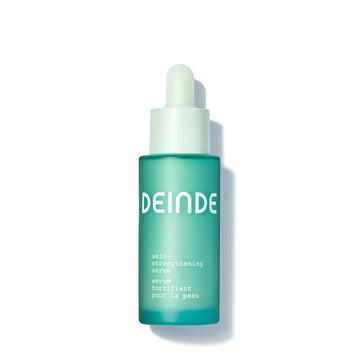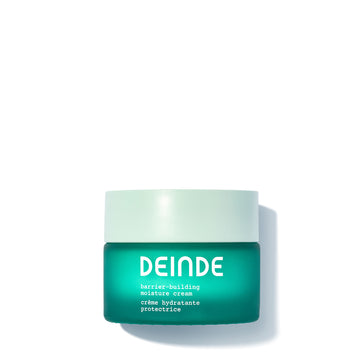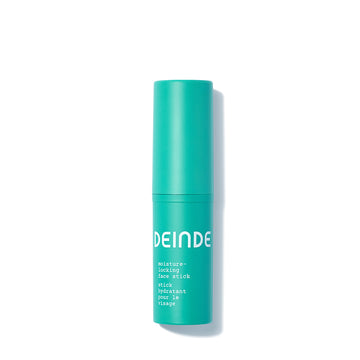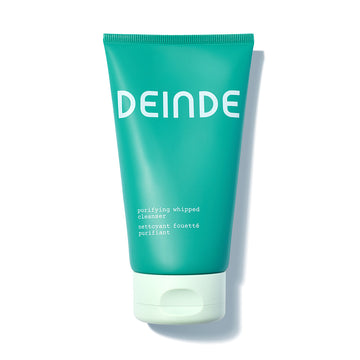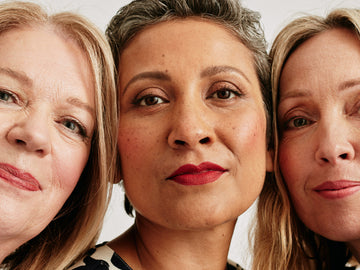
Menopause Skin Changes & Inflammaging
If you’re between the ages of 45-50, you’re likely well-versed in the concept of menopause — maybe even an expert. Beyond riding a hormonal roller coaster, menopause makes us reassess the body’s response to daily stressors.
For those who haven't reached this stage in life or experienced it firsthand, menopause can be a somewhat mysterious topic. It’s important to recognize that menopause has impacts beyond “hot flashes” — it’s a complex and multifaceted biological process that influences everything from bone density to the skin barrier.
What is Menopause?
Menopause is a natural biological process that occurs in women, typically between the ages of 45 and 55. During this phase, ovaries produce fewer hormones, like estrogen and progesterone, which lead to the end of menstrual periods. It signifies the end of a woman's reproductive capacity and is a normal part of the aging process. Generally, the body reacts to these changes in hormone levels in the following ways:
→ Hot Flashes
As the body steps into its new chapter, estrogen levels radically shift. Hot flashes are a common menopausal symptom brought on by hormonal swings — estrogen triggers fluctuations in the body’s internal temperature, convincing the brain of overheating. At the same time, the body initiates responses to cool down: blood vessels dilate to release heat, resulting in a sudden rush of blood and the sensation of heat, redness, and sweat
→ Sleep
The hormonal fluctuations that impact the body’s internal temperature regulation are often linked to insomnia and poor sleep quality. Mood swings and anxiety, common during menopause, may also impact sleep. Over time, mediocre sleep can lead to fatigue, inflammaging, and additional health concerns
→ Mood Swings
Hormonal shifts can affect neurotransmitters like serotonin and norepinephrine, which are key to regulating mood. An estrogen decrease can lead to an imbalance of these neurotransmitters, prompting mood swings, irritability, and depressive episodes
→ Changes In Bone Density
Estrogen plays a crucial role in bone maintenance by promoting bone formation and inhibiting resorption (the breakdown and reabsorbing of bone tissue). Reduced estrogen increases the risk of osteoporosis and fractures due to lower levels of bone remodeling
→ Shifts in Energy
As a woman’s reproductive system transitions, the body reallocates energy resources from fertility-related processes to other functions. Often, the body prioritizes energy for bone health, as there is a link between hormonal shifts and bone health
How does menopause impact the skin?
Menopause can impact skin health due to the radical swing of hormones, notably estrogen. Estrogen is recognized to play a role in maintaining skin’s elasticity and hydration. When estrogen levels decline, collagen production follows, leading to thinner skin and the development of fine lines, wrinkles, and sagging. Decreased estrogen may also impact skin barrier functionality, increasing skin sensitivity. Additionally, menopause prompts:
→ Reduced Hydration
Estrogen regulates skin hydration levels by managing aquaporins, channels that facilitate movement in and out of skin cells. This hormone is also known to stimulate the production of hyaluronic acid, a humectant that attracts and retains skin moisture. When estrogen levels decline, these processes are impacted, increasing the risk of dryness and serious dehydration
→ Thinning of the Epidermis
The epidermis, the outermost layer of skin, is the body’s first line of defense against external threats. As estrogen levels fluctuate, the skin loses collagen and hyaluronic acid. These losses, combined with an altered skin matrix, result in a thinner epidermis layer with increased skin sensitivity. This epidermal thinning can make skin more prone to sun damage, making SPF even more important during sun exposure
→ Slow Cell Turnover
Keratinocytes are the primary cells in the epidermis — they’re responsible for the formation of the skin barrier. Estrogen, at ideal levels, maintains the balance between the production and shedding of keratinocytes. When estrogen decreases, keratinocytes become unbalanced. As dead skin cells accumulate, skin becomes dull and uneven. Buildup can clog pores, and slow cell turnover prompts slower wound healing
What is the relationship between inflammaging and menopause?
Menopause is characterized by a decline in estrogen, a hormone well-studied for its anti-inflammatory properties. This significant hormonal shift disrupts the body’s ability to regulate inflammation while influencing the immune system via changes in immune cell function and cytokine production. In short, menopause welcomes a pro-inflammatory environment, creating an ideal destination for inflammaging.
During menopause, women may experience increased oxidative stress due to both hormonal changes and lifestyle factors. Oxidative stress is known to trigger inflammaging via the release of inflammatory cytokines, prompting tissue damage and the perpetuation of chronic inflammation.
There’s a direct link between menopause, the composition of the gut microbiome and inflammaging. When estrogen levels decline, the composition of the gut microbiome can become imbalanced — altering the number of beneficial and potentially harmful microorganisms like pathogenic bacteria. This microbial imbalance in the gut can directly influence inflammaging because it promotes the release of pro-inflammatory cytokines and immune signaling molecules, encouraging low-grade inflammation. As inflammaging continues to become better understood, we expect to see more research published exploring how chronic low-grade inflammation is linked to common transitions like menopause.
What are some menopause skin solutions?
The few years of menopause can be jarring, confusing, and frustrating. It can feel like your body isn’t your own, and you’re just along for the ride. The physical and emotional changes that accompany menopause have their challenges, but with the right approach and understanding that this process is natural, one can navigate this new chapter with intention. As menopausal changes extend to the skin, there’s a need for specialized skincare and lifestyle practices to promote skin health and confidence during this transition.
1. Adopt a Supportive Skincare Routine for Mature Skin
Menopausal skincare is all about support. As hormonal shifts result in sensitive skin that is prone to dryness, look for products that encourage moisture retention and skin barrier strengthening. A gentle cleanser that removes impurities without stripping natural oils helps skin remain balanced without unnecessary irritation. Products that are moisture-rich, like hydrating serums and moisturizers with nourishing ingredients like ceramides, step in to restore natural plumpness and resilience, which tend to be interrupted due to declining collagen and elastin levels. Always use sunscreen, as UV damage accelerates inflammaging — especially when skin starts to thin.
2. Address Inflammaging
When menopause meets inflammaging, fuel is added to the fire. Aging mechanisms are accelerated as the body enters a new state of chronic stress and inflammation. There’s a lot happening internally as hormonal levels shift and internal systems reimagine themselves for the next chapter. Prioritizing sleep, stress management techniques, a healthy diet, and inflammaging-specific skincare products goes a long way during this tumultuous time.
Studies cited:
- Menopause and the Skin: Old Favorites and New Innovations in Cosmeceuticals for Estrogen-Deficient Skin | NIH
- Estrogen and Aging Skin | NIH
- The Effects of Menopasue on the Skin and Other Connective Tissues | Gynecological Endocrinology
- Skin Changes in Menopause | ScienceDirect
